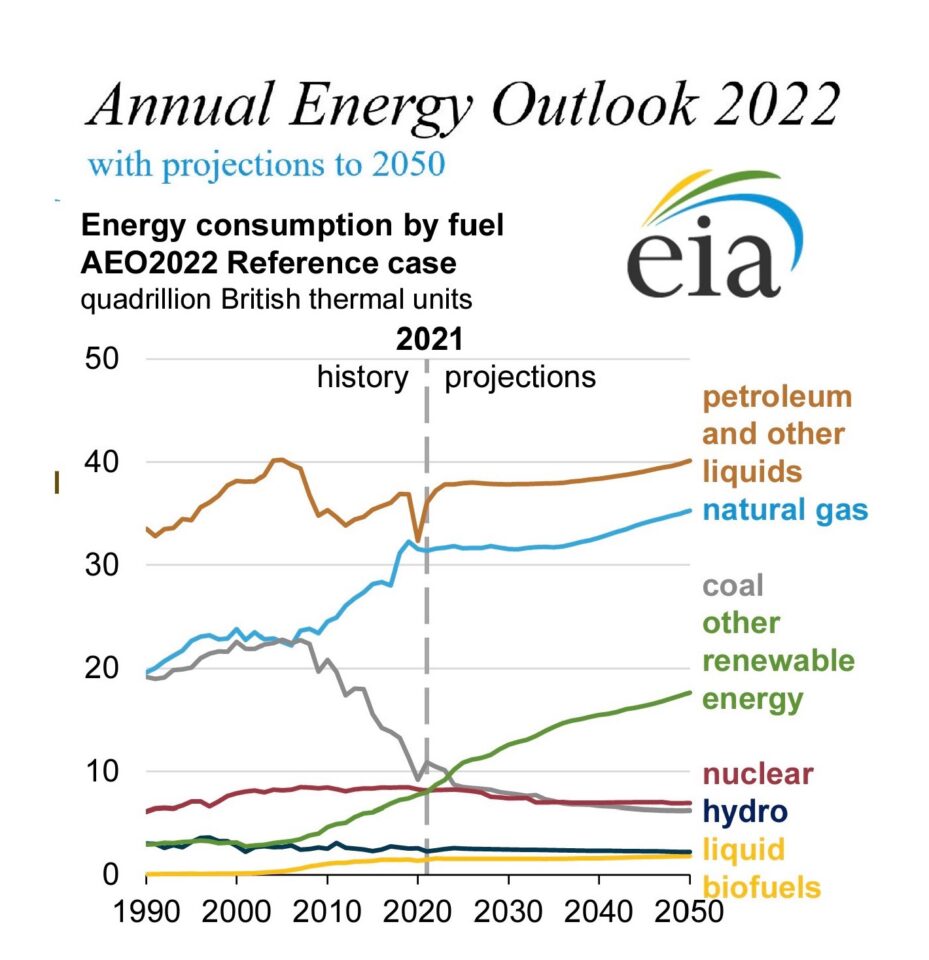It’s Time For Energy Reality to Take Center Stage
When it comes to energy, rhetoric sure seems to get a lot more attention than reality.
If many politicians and media outlets were to be believed, the “green” energy transition is just around the corner and the permanent cancellation of our hydrocarbon fuel-driven society is imminent. But in reality, we are going to need even more traditional energy sources such as oil and natural gas than we are currently using in the decades to come. And it’s not just the fossil fuel industry making that assertion.
The Biden administration’s own Energy Information Administration (EIA) contradicts its boss’s energy narrative in its latest annual energy outlook, noting that petroleum and natural gas will likely be used in higher quantities than they are today nearly three decades from now and will remain the United States’ leading energy sources through at least 2050.

That is not a misprint. EIA deputy administrator Stephen Nalley even said plainly during the report’s rollout, “We do not see liquid fuels and natural gas losing their place as the top two sources of energy in the US to 2050. That appears to be true under a pretty wide variety of assumptions about economic growth, technology and energy development costs and prices.”
Why has the EIA consistently reached this conclusion over the past several years? Because as a non-political entity, it has to take into account the reality that a sudden switch to reliance on weather- and foreign mineral-dependent technologies for all of our electricity and transportation needs simply isn’t feasible.
Throw in the fact that that 40 percent of the world’s oil consumption can be attributed to making everything from “mascara to medical devices,” as NBC News recently reported, and it’s clear that reality should take precedent over rhetoric when it comes to policies concerning our domestic oil and natural gas supply.
The current crisis in Europe provides the ultimate reality check and a prime example of a model the United States needs to avoid. Germany, the European Union’s largest economy, has been doing everything in its power to cancel oil and natural gas for the past 20 years. So how is it going?
Germany’s taxpayer-funded renewable energy push known as “Energiewende” has left it with the highest retail electricity costs in the world. A recent IEEE Spectrum report also concluded, “Without anything like the expensive, target-mandated Energiewende, the United States has decarbonized at least as fast as Germany, the supposed poster child of emerging greenness.” And despite all of its “green” policies, petroleum remains Germany’s leading source of energy. Where does Germany get most of its petroleum? You guessed it – Russia. Same story for its natural gas supply.
The fundamental need for oil and natural gas can explain why even Tesla founder Elon Musk is realistic about the need for the United States to produce as much of both as possible within its borders. Musk recently tweeted, “Hate to say it, but we need to increase oil and gas output immediately. Extraordinary times demand extraordinary measures.” Musk also stated in a December interview that, “The reality is, if we didn’t have oil and gas right now, civilization would collapse and everyone would be starving. So, we also need oil and gas right now. It would be absurd to just stop it. It’s not feasible.”
As Musk is likely aware, widespread EV adoption will require massive increases in mineral mining for batteries and other components. China currently enjoys a virtual monopoly in mineral mining, processing and manufacturing of components necessary for solar panels, wind turbines and EVs. This explains why simply “going green” won’t result in energy independence any time soon. With those supply-chain issues in mind, the aforementioned EIA report notes that despite all the hoopla about EVs, gasoline-powered vehicles will likely represent 79 percent of new personal vehicle sales by 2050 and internal combustion engine vehicles won’t peak until 2038.
Though striving to improve our energy sources remains a noble quest for the future, we must focus on the reality of the present moment. We will need oil and natural gas for many decades to come and it is best to produce as much of it here in the United States as possible to avoid the dependence that is threatening the security of Germany and our other European allies.
